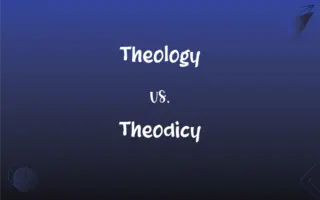Tie vs. Tye: What's the Difference?
Edited by Aimie Carlson || By Janet White || Updated on October 6, 2023
"Tie" generally refers to fastening or binding something, while "Tye" is a less common English word and can refer to a chain on a ship. Both have various definitions and uses in different contexts.

Key Differences
In distinct elucidation, "Tie" customarily is recognized for its role as both a noun and a verb in the English language. Generally, as a noun, it refers to a piece of string, cord, or similar used to fasten or secure something, such as a shoelace. When used as a verb, it conveys the action of attaching or binding with a knot, like tying a ribbon.
Contrastingly, "Tye" bears a dissimilar and perhaps less commonly applied meaning, with its prevalent use reflected in nautical terms. Generally encountered in historical or specialized texts, “Tye” frequently points towards a chain or a sort of connection often associated with ships and their sails, providing a distinguishable utilization from its homophone.
Digging deeper, "Tie" often permeates our daily conversations and writing, especially in a business or casual setting. A well-known usage would be in reference to neckwear that’s common in formal and business attire. In diverse sports, such as soccer or hockey, a “tie” also indicates an equal score among competing teams, demonstrating its versatile applicability.
Analyzing "Tye" more closely, one may observe its scarcity in regular dialogues or writings, implicating its specialized nature. In some regional dialects and older English use, "Tye" might find a place, perhaps denoting specific local items or perhaps used in a specific, localized naming convention, illustrating a colloquial application that may not be universally acknowledged.
In summary, “Tie” and “Tye,” while phonetically identical, steer clear from one another in their practical application and frequency of use. Where "Tie" finds its place in common language, applicable in various scenarios from fashion to sports, "Tye" likely surfaces in more specialized, nautical, or historical contexts, clearly demarcating a divergence in their typical employment.
ADVERTISEMENT
Comparison Chart
Common Usage
Highly common
Less common
General Meaning
Fastening/binding
A chain on a ship
Part of Speech
Both noun and verb
Commonly a noun
Context of Use
Varied (daily, sports, etc.)
Specialized (nautical)
Associated Connotations
Neutral, versatile
Historical, specialized
ADVERTISEMENT
Tie and Tye Definitions
Tie
To fasten or secure with or as if with a cord, rope, or strap
Tied the kite to a post.
Tie up a bundle.
Tye
Obsolete form of tie
Tie
To fasten by drawing together the parts or sides and knotting with strings or laces
Tied her shoes.
Tye
(nautical) A chain or rope, one end of which passes through the mast, and is made fast to the center of a yard; the other end is attached to a tackle, by means of which the yard is hoisted or lowered.
Tie
To make by fastening ends or parts
Tie a knot.
Tye
(mining) A trough for washing ores.
Tie
To put a knot or bow in
Tie a neck scarf.
Tye
(British) A patch of common land, often a village green.
Tie
To confine or restrict as if with cord
Duties that tied him to the office.
Tye
A knot; a tie.
Tie
To bring together in relationship; connect or unite
Friends who were tied by common interests.
People who are tied by blood or marriage.
Tye
A chain or rope, one end of which passes through the mast, and is made fast to the center of a yard; the other end is attached to a tackle, by means of which the yard is hoisted or lowered.
Tie
To equal (an opponent or an opponent's score) in a contest.
Tye
A trough for washing ores.
Tie
To equal an opponent's score in (a contest)
Tied the game with minutes remaining.
Tye
See Tie, the proper orthography.
Tie
(Music)To join (notes) by a tie.
Tye
A chain or rope used for hoisting a sail.
The sailor adjusted the tye to manage the sail effectively.
Tie
To be fastened or attached
The apron ties at the back.
Tie
To achieve equal scores in a contest.
Tie
A cord, string, or other means by which something is tied.
Tie
Something that connects or unites; a link
A blood tie.
Marital ties.
Tie
A necktie.
Tie
A beam or rod that joins parts and gives support.
Tie
One of the timbers or slabs of concrete laid across a railroad bed to support the rails.
Tie
An equality of scores, votes, or performance in a contest
The election ended in a tie.
Tie
A contest so resulting; a draw.
Tie
(Music)A curved line above or below two notes of the same pitch, indicating that the tone is to be sustained for their combined duration.
Tie
A knot; a fastening.
Tie
A knot of hair, as at the back of a wig.
Tie
A necktie (item of clothing consisting of a strip of cloth tied around the neck). See also bow tie, black tie.
Tie
A twist tie, a piece of wire embedded in paper, strip of plastic with ratchets, or similar object which is wound around something and tightened.
Tie
A strong connection between people or groups of people.
The sacred ties of friendship or of duty
The ties of allegiance
Tie
(construction) A structural member firmly holding two pieces together.
Ties work to maintain structural integrity in windstorms and earthquakes.
Tie
A horizontal wooden or concrete structural member that supports and ties together rails.
Tie
The situation in which two or more participants in a competition are placed equally.
It's two outs in the bottom of the ninth, tie score.
Tie
(cricket) The situation at the end of all innings of a match where both sides have the same total of runs (different from a draw).
Tie
An equalizer, a run, goal, point, etc which causes participants in a competition to be placed equally or have the same score(s).
Tie
A meeting between two players or teams in a competition.
The FA Cup third round tie between Liverpool and Cardiff was their first meeting in the competition since 1957.
Tie
(music) A curved line connecting two notes of the same pitch denoting that they should be played as a single note with the combined length of both notes.
Tie
(statistics) One or more equal values or sets of equal values in the data set.
Tie
(surveying) A bearing and distance between a lot corner or point and a benchmark or iron off site.
Tie
(graph theory) A connection between two vertices.
Tie
A tiewig.
Tie
(transitive) To twist (a string, rope, or the like) around itself securely.
Tie this rope in a knot for me, please.
Tie the rope to this tree.
Tie
(transitive) To form (a knot or the like) in a string or the like.
Tie a knot in this rope for me, please.
Tie
(transitive) To attach or fasten (one thing to another) by string or the like.
Tie him to the tree.
Tie
To secure (something) by string or the like.
Tie your shoes.
Tie
(ambitransitive) To have the same score or position as another in a competition or ordering.
They tied for third place.
They tied the game.
Tie
To have the same score or position as (another) in a competition or ordering.
He tied me for third place.
Tie
(music) To unite (musical notes) with a line or slur in the notation.
Tie
To believe; to credit.
Tie
In the Perl programming language, to extend (a variable) so that standard operations performed upon it invoke custom functionality instead.
Tie
A knot; a fastening.
Tie
A bond; an obligation, moral or legal; as, the sacred ties of friendship or of duty; the ties of allegiance.
No distance breaks the tie of blood.
Tie
A knot of hair, as at the back of a wig.
Tie
An equality in numbers, as of votes, scores, etc., which prevents either party from being victorious; equality in any contest, as a race.
Tie
A beam or rod for holding two parts together; in railways, one of the transverse timbers which support the track and keep it in place.
Tie
A line, usually straight, drawn across the stems of notes, or a curved line written over or under the notes, signifying that they are to be slurred, or closely united in the performance, or that two notes of the same pitch are to be sounded as one; a bind; a ligature.
Tie
Low shoes fastened with lacings.
Tie
To fasten with a band or cord and knot; to bind.
My son, keep thy father's commandment, and forsake not the law of thy mother: bind them continually upon thine heart, and tie them about thy neck.
Tie
To form, as a knot, by interlacing or complicating a cord; also, to interlace, or form a knot in; as, to tie a cord to a tree; to knit; to knot.
Tie
To unite firmly; to fasten; to hold.
In bond of virtuous love together tied.
Tie
To hold or constrain by authority or moral influence, as by knotted cords; to oblige; to constrain; to restrain; to confine.
Not tied to rules of policy, you findRevenge less sweet than a forgiving mind.
Tie
To unite, as notes, by a cross line, or by a curved line, or slur, drawn over or under them.
Tie
To make an equal score with, in a contest; to be even with.
Tie
To make a tie; to make an equal score.
Tie
Neckwear consisting of a long narrow piece of material worn (mostly by men) under a collar and tied in knot at the front;
He stood in front of the mirror tightening his necktie
He wore a vest and tie
Tie
A social or business relationship;
A valuable financial affiliation
He was sorry he had to sever his ties with other members of the team
Many close associations with England
Tie
The finish of a contest in which the score is tied and the winner is undecided;
The game ended in a draw
Their record was 3 wins, 6 losses and a tie
Tie
A horizontal beam used to prevent two other structural members from spreading apart or separating;
He nailed the rafters together with a tie beam
Tie
A fastener that serves to join or link;
The walls are held together with metal links placed in the wet mortar during construction
Tie
Equality of score in a contest
Tie
(music) a slur over two notes of the same pitch; indicates that the note is to be sustained for their combined time value
Tie
One of the cross braces that support the rails on a railway track;
The British call a railroad tie a sleeper
Tie
A cord (or string or ribbon or wire etc.) with which something is tied;
He needed a tie for the packages
Tie
Fasten or secure with a rope, string, or cord;
They tied their victim to the chair
Tie
Finish a game with an equal number of points, goals, etc.;
The teams drew a tie
Tie
Limit or restrict to;
I am tied to UNIX
These big jets are tied to large airports
Tie
Connect, fasten, or put together two or more pieces;
Can you connect the two loudspeakers?
Tie the ropes together
Link arms
Tie
Form a knot or bow in;
Tie a necktie
Tie
Create social or emotional ties;
The grandparents want to bond with the child
Tie
Perform a marriage ceremony;
The minister married us on Saturday
We were wed the following week
The couple got spliced on Hawaii
Tie
Make by tying pieces together;
The fishermen tied their flies
Tie
Unite musical notes by a tie
Tie
A piece of cloth worn around the neck.
He wore a red tie to the meeting.
Tie
To bind or fasten with a knot or bow.
She learned to tie her shoelaces.
Tie
An equal score in a game.
The match ended in a tie.
Tie
A structural component binding two objects.
The tie between the two beams ensures stability.
Tie
To restrict or bind.
His responsibilities tie him to the city.
FAQs
Can "Tye" be used interchangeably with "Tie"?
Typically no, they have different meanings and are not interchangeable, although pronunciation is similar.
How can "Tie" be used as a verb?
"Tie" as a verb generally means to bind, fasten, or secure something with a knot or bow.
What is a popular colloquial use of "Tie"?
Colloquially, "Tie" may refer to achieving an equal score in a game: e.g., "The teams were tied at the end of the match."
What fields or areas often utilize the term "Tye"?
"Tye" is more frequently encountered in nautical contexts or older English use, signifying a chain for hoisting a sail.
Can "Tie" also imply a relationship between things or concepts?
Yes, "Tie" can suggest a connection or link, as in “family ties” or “the tie between actions and consequences.”
Does "Tie" hold meanings in various domains like sports, fashion, and construction?
Absolutely, "Tie" is versatile, denoting neckwear in fashion, equal scores in sports, and a binding component in construction.
How is "Tie" commonly used as a noun?
As a noun, "Tie" often refers to a piece of cloth worn around the neck or a situation where competitors have equal scores.
Is "Tye" found in everyday English conversations?
Rarely, as "Tye" tends to surface more in specialized, nautical, or historical contexts.
How does "Tye" appear in nautical contexts?
In nautical terms, a "Tye" is a chain or rope for hoisting and lowering a sail on a ship’s mast.
Is "Tye" considered archaic in modern English?
Somewhat, yes. "Tye" is less commonly used and may appear in specialized or older texts.
Is "Tye" a variant of "Tie" in any English dialects?
In some dialects or historical contexts, "Tye" might be used in place of "Tie," but this is not standard in modern English.
Can "Tie" imply a restriction or obligation?
Yes, "Tie" can mean being bound to something, e.g., "He is tied to his responsibilities."
Do other languages use similar words to "Tie" with like meanings?
Some languages might have words phonetically similar to "Tie" but with different meanings, as lexical similarities can exist.
Can "Tye" imply a type of dyeing?
While phonetically similar to “tie” in “tie-dye”, "Tye" does not commonly pertain to any dyeing techniques.
How does "Tie" function in business language?
In business, a “Tie” often refers to neckwear, but metaphorically it might also describe business connections or relations.
What part of speech is "Tye" primarily used as?
"Tye" is predominantly used as a noun in English.
Does "Tie" have metaphorical uses in English?
Yes, “Tie” can be metaphorically used to describe relationships or connections between abstract concepts.
Could "Tye" ever be a proper noun?
"Tye" might be used as a proper noun, perhaps as a name, but it's not a standard usage.
Can "Tie" be used in idiomatic expressions?
Yes, e.g., "Tie the knot," an idiomatic expression referring to getting married.
How is “Tie” used in a construction context?
In construction, a "Tie" refers to a structural component that binds or connects other parts together for stability.
About Author
Written by
Janet WhiteJanet White has been an esteemed writer and blogger for Difference Wiki. Holding a Master's degree in Science and Medical Journalism from the prestigious Boston University, she has consistently demonstrated her expertise and passion for her field. When she's not immersed in her work, Janet relishes her time exercising, delving into a good book, and cherishing moments with friends and family.
Edited by
Aimie CarlsonAimie Carlson, holding a master's degree in English literature, is a fervent English language enthusiast. She lends her writing talents to Difference Wiki, a prominent website that specializes in comparisons, offering readers insightful analyses that both captivate and inform.































































